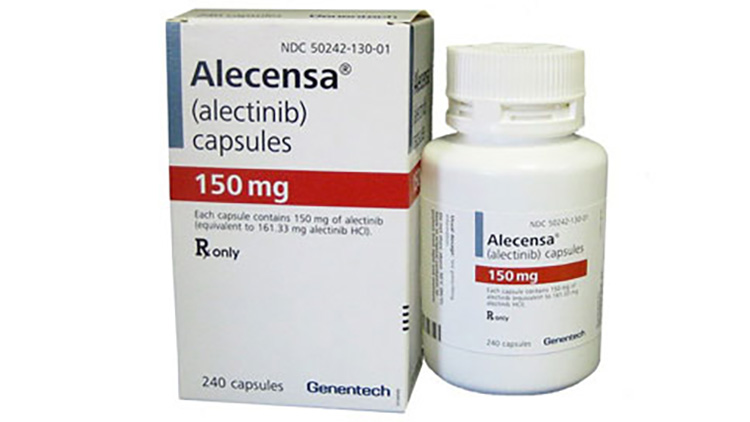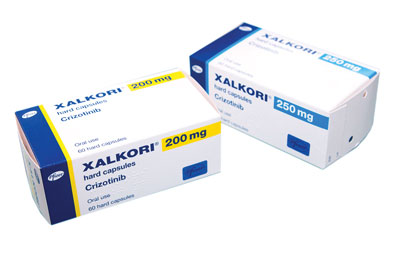Alecensa (alectinib) vs Xalkori (crizotinib)
Alecensa (alectinib) vs Xalkori (crizotinib)
Alecensa (alectinib) and Xalkori (crizotinib) are both oral medications used to treat non-small cell lung cancer (NSCLC) with specific genetic mutations in the ALK gene. Alecensa is often preferred as a first-line treatment because it has shown higher efficacy and a lower risk of side effects, particularly in the central nervous system, compared to Xalkori. However, the choice between Alecensa and Xalkori should be made based on individual patient characteristics, potential drug interactions, specific ALK mutations, and the patient's overall health profile, with a healthcare provider's guidance.
Difference between Alecensa and Xalkori
| Metric | Alecensa (alectinib) | Xalkori (crizotinib) |
|---|---|---|
| Generic name | Alectinib | Crizotinib |
| Indications | ALK-positive non-small cell lung cancer (NSCLC) | ALK or ROS1-positive NSCLC |
| Mechanism of action | ALK inhibitor | ALK and ROS1 inhibitor |
| Brand names | Alecensa | Xalkori |
| Administrative route | Oral | Oral |
| Side effects | Constipation, fatigue, edema, myalgia, anemia | Visual disorders, gastrointestinal effects, edema, elevated transaminases |
| Contraindications | Hypersensitivity to alectinib or any component of the formulation | Hypersensitivity to crizotinib or any component of the formulation |
| Drug class | Tyrosine kinase inhibitor | Tyrosine kinase inhibitor |
| Manufacturer | Genentech (Roche) | Pfizer |
Efficacy
Alecensa (Alectinib) Efficacy in Lung Cancer
Alecensa (alectinib) is a targeted therapy approved for the treatment of ALK-positive non-small cell lung cancer (NSCLC). Its efficacy has been demonstrated in several clinical trials. Notably, the ALEX trial, which was a pivotal phase III study, showed that alectinib significantly improved progression-free survival (PFS) compared to crizotinib in the first-line treatment of ALK-positive NSCLC. Patients treated with alectinib had a median PFS of 34.8 months, compared to 10.9 months for those on crizotinib. Moreover, alectinib has shown high central nervous system (CNS) efficacy, reducing the risk of CNS progression or death by 84% compared to crizotinib.
Xalkori (Crizotinib) Efficacy in Lung Cancer
Xalkori (crizotinib) is another targeted therapy used in the treatment of ALK-positive NSCLC. It was the first ALK inhibitor approved for this indication. In clinical trials, crizotinib has demonstrated significant efficacy in shrinking tumors and prolonging PFS. The PROFILE 1014 study, which compared crizotinib with chemotherapy in previously untreated advanced ALK-positive NSCLC, showed a median PFS of 10.9 months for crizotinib versus 7 months for chemotherapy. However, crizotinib is associated with a higher rate of progression in the CNS, which is a common site of metastasis in ALK-positive NSCLC patients.
Comparison of Alecensa and Xalkori
When comparing Alecensa and Xalkori, the evidence suggests that Alecensa may offer superior efficacy, particularly in terms of PFS and CNS involvement. The ALEX trial directly compared alectinib to crizotinib and found that alectinib not only prolonged PFS but also had a more favorable safety profile and was less toxic than crizotinib. Additionally, alectinib's ability to better penetrate the CNS and prevent brain metastases is a significant advantage, as CNS metastases can significantly impact patient quality of life and prognosis.
Conclusion
Both Alecensa (alectinib) and Xalkori (crizotinib) have changed the treatment landscape for ALK-positive NSCLC, offering patients targeted options that can lead to better outcomes compared to traditional chemotherapy. While both drugs have shown efficacy in treating lung cancer, alectinib seems to have an edge over crizotinib, particularly in terms of progression-free survival and CNS efficacy. These findings underscore the importance of personalized medicine and the need for ongoing research to optimize treatment for lung cancer patients.
Regulatory Agency Approvals
Alecensa
-
European Medical Agency (EMA), European Union

-
Food and Drug Administration (FDA), USA

-
Health Canada

-
Pharmaceuticals and Medical Devices Agency (PMDA), Japan

-
Therapeutic Goods Administration (TGA), Australia

-
Medsafe (NZ)

Xalkori
-
European Medical Agency (EMA), European Union

-
Food and Drug Administration (FDA), USA

-
Health Canada

-
Pharmaceuticals and Medical Devices Agency (PMDA), Japan

-
Therapeutic Goods Administration (TGA), Australia

Access Alecensa or Xalkori today
If Alecensa or Xalkori are not approved or available in your country (e.g. due to supply issues), you can access them via Everyone.org.
How it works

Make an enquiry
Choose the medicine you want to buy, answer a couple of questions, and upload your prescription to speed things up. We’ll get back to you within 24 hours.


Make an enquiry
Choose the medicine you want to buy, answer a couple of questions, and upload your prescription to speed things up. We’ll get back to you within 24 hours.


Breeze through the paperwork
We'll guide you through the required documents for importing unapproved medicine, ensuring you have all the necessary information.


Get a personalized quote
We’ll prepare a quote for you, including medicine costs and any shipping, administrative, or import fees that may apply.


Receive your medicine
Accept the quote and we’ll handle the rest - sourcing and safely delivering your medicine.

Some text on this page has been automatically generated. Speak to your physician before you start a new treatment or medication.
Let's talk
If you have any questions, call us or send us a message through WhatsApp or email:
Contact us




